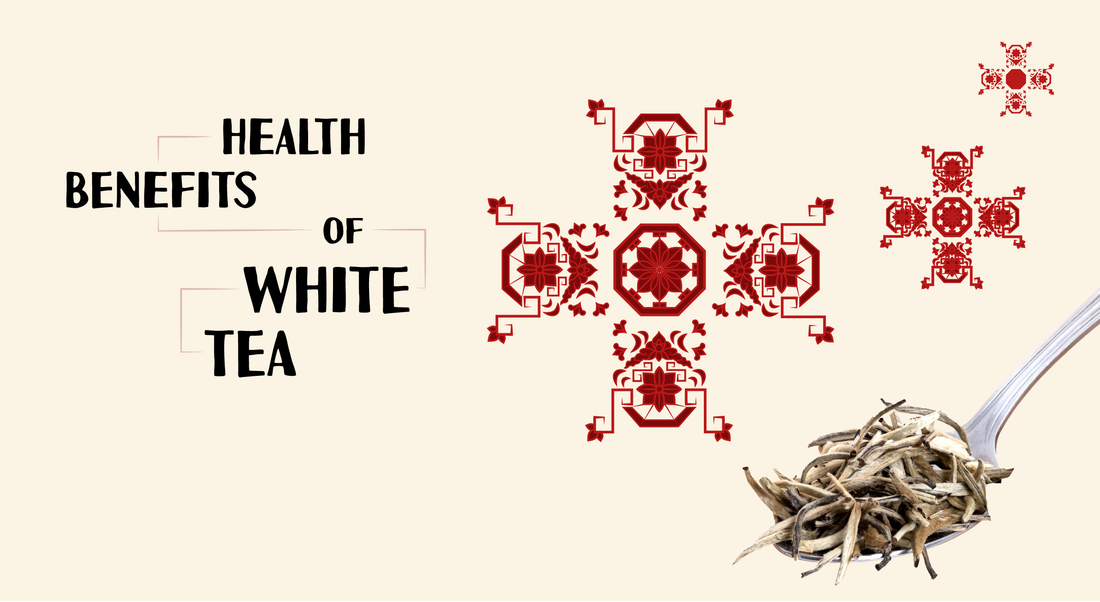Despite the common misconception that each tea is initially made from different types of trees, white tea is made from Camellia sinensis trees, like yellow, green, black, dark, and oolong tea. Specifically, white tea usually features young or minimally processed leaves of Camellia sinensis.
The leaves for white tea are picked just before the buds have fully opened and then left to dry in a natural sun. White tea is not rolled or oxidized, making it feel lighter than most other teas, just like its color - pale yellow. White tea is mainly harvested in Fujian province, China, but more recently, it has started being produced in Taiwan, Eastern Nepal, Thailand, Southern Sri Lanka, and northeast India.
The main varieties of white tea include Silver Needle, White Peony, Gongmei, Shoumei, etc.
Primary health benefits of white tea consumption
White tea's effects on human health have been a research topic since 2011. Since then, scientists around the world have discovered these health benefits of white tea:
Antioxidant effect
- White tea is rich in antioxidants - warriors that protect our cells from free radicals - harmful cells that appear as a natural byproduct of normal metabolism. Free radicals contribute to the development of many chronic health problems, inflammatory diseases, cataracts, and cancer. Antioxidants prevent the formation of radicals by scavenging or by promoting their decomposition. White tea is abundant with antioxidants, making it a perfect ally for hindering radicals' formation.
Skin health
- Free radicals also play a role in human skin aging because white tea's antioxidant containment helps your skin stay young longer. White tea also seems to improve the skin's resistance to aging caused by an unpleasant environment or living habits. White tea, due to its antioxidant effect, prolongs beauty and youth.
Lowers the risk of insulin resistance and helps glucose regulation
- Insulin is a hormone naturally produced in your body that helps to control your blood sugar. However, due to different possible factors, including high sugar consumption, some people develop insulin resistance. In other words, stop responding to insulin. Some studies suggest that the polyphenols in white tea may lower your risk of insulin resistance. Thanks to the same polyphenols, white tea positively affects the body's glucose regulation and lipid metabolism. However, it is essential to emphasize that the white tea polyphenol studies were primarily performed on animals and found that polyphenols in white tea may enhance the effects of insulin and prevent high blood sugar levels. Seventeen human-based studies with over 1,100 participants found the same as the animal studies. Further human-based research could help clarify the results found.
Liver restoration
- Aged white tea may effectively improve the antioxidant capacity of the liver and may even repair liver damage caused by excessive drinking.
Generally improves the immune system
- The study suggests that due to all the beneficial white tea elements, aged white tea has apparent anti-inflammatory and fire-clearing effects.
Dental health improvement
- Thanks to white tea's anti-inflammatory properties, it helps fight bacteria, which prevents gum inflammation and allows fewer cavities. White tea also contains catechins, tannins, and fluoride, which also help to prevent cavities and strengthen your enamel, which respectively helps to protect you from bacterial acid damage to your teeth. Catechins may also help to prevent plaque growth on the surface of your teeth.
Promote weight loss
- Green tea is often presented as the tea for weight loss. However, white tea can be as effective when it comes to burning fat. Both teas have similar levels of catechins (such as EGCG - epigallocatechin gallate) and caffeine that help with burning fat. One example is a study conducted in test tubes, which discovered that white tea extract could boost fat breakdown and inhibit the formation of new fat cells, primarily attributed to its EGCG containment. Probably because of white tea's low popularity, there has not been much research done in the area about its effects on weight loss. More research in this area can help us learn more about its impact on the body.
Digestion improvement
- It is common knowledge that many people turn to tea after a heavy meal to help their digestion, and white tea is no exception; in fact, it is especially effective in aiding digestion.
Cancer prevention
- Several test-tube studies have shown that white tea extract has triggered cell death in several types of lung cancer and stopped the spread of colon cancer cells. Though all the test-tube studies used large amounts of white tea, nothing specific can be said about its effects on cancer cells during moderate tea consumption.
Improve heart health
- The same polyphenols found in white tea also aid in reducing the risk of heart disease because antioxidants help lower blood pressure and levels of bad LDL cholesterol in our bodies. In addition, by examining five studies, researchers found that individuals who consumed three cups or more of tea daily experienced a 21% reduced risk of heart disease. While white tea helps lower your chances of heart disease, making other healthy lifestyle choices is essential, such as eating more fruits and vegetables, exercising regularly, and not overworking yourself.

Many Chinese and foreign researchers have proven all these benefits of long-term white tea drinking. Over an extended period of white tea consumption, it can significantly increase your immunity and give many prophylactic perks. The longer white tea is stored, the higher nutritional value it can offer.
Unfortunately, white tea won't cure any genetic illnesses, but you can't ignore its obvious benefits that become a great addition to the lovely taste of white tea.
Resources:
fdbcha: Detailed explanation of the nutritional value and functions of white tea
WaterFrop: 9 benefits of white tea you should know
HealthLine: 10 Impressive Benefits of White Tea
The American journal of clinical nutrition: Tea consumption and cardiovascular disease risk

